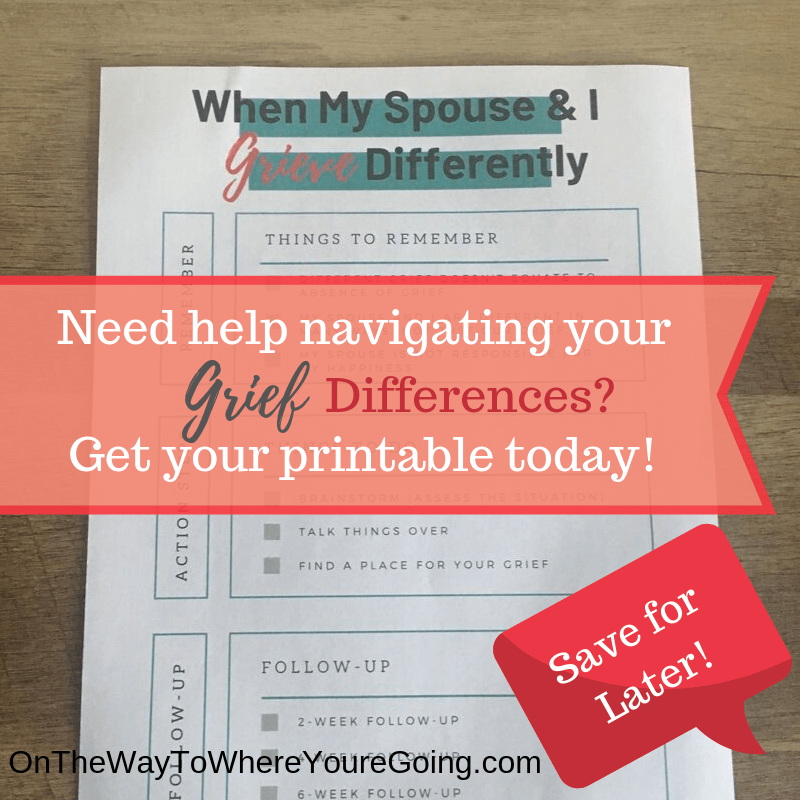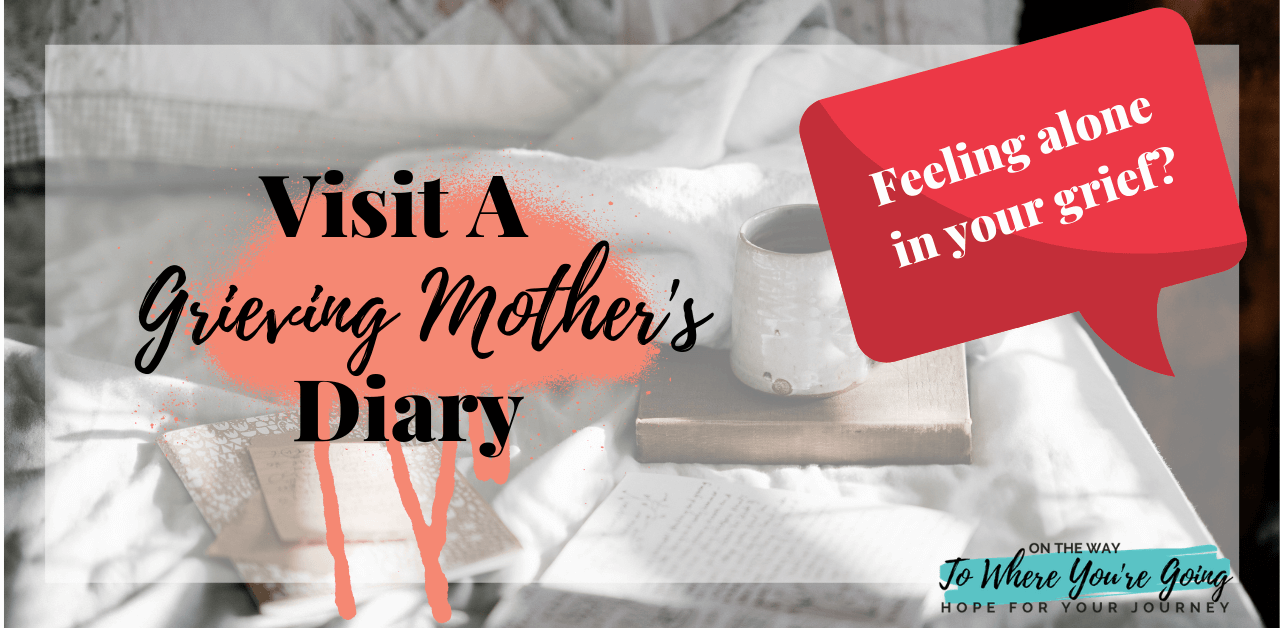“Before their child’s death, everything had its place. Everyone knew what was expected.”
The loss of a child can have devastating effects on a marriage when a spouse grieves differently. Differing grieving styles may make the loss even more pronounced. With the death of a child, a marriage is thrust into unknown, rugged terrain.
Death never asks if you’re ready. It’s in charge, swirling through your home, with as much destruction as an F4 tornado. You can’t run from it, and attempting to find shelter within your home can feel close to impossible. You see, it’s hard to find protection from a storm amidst a broken structure.
The Broken Structure
Before their child’s death, everything had its place. Everyone knew what was expected. There was a routine; right and wrong… clear guidelines. But, suddenly, the structure is broken. Routines are knocked out of kilter, and the dismal “rule book” cannot be read amidst the tirade of tears. Simply put, nobody knows what to do anymore. Roles are turned upside down. They feel heavy, unmanageable, and awkward. Soon, expectations aren’t being met, and you’re wondering who’s on the other side of the table.
Differences Become Blatant When You Grieve Differently
“Their differences are screaming so loudly, they can hardly hear or see anything else.”
When spouses grieve differently, their differences become blatantly obvious. One spouse drowns themselves in their work. The other can barely make it to work two days consecutively. One spouse wants to talk about their child all the time. The other barely mentions their name. Someone wants to move for a fresh start. The other wonders how they could possibly conceive of starting anything new without their precious child. Their differences are screaming so loudly, they can hardly hear or see anything else. This is not what you thought would happen. He or she is not who you thought they were. Did they even love our child?
Different Grief Doesn’t Mean Absence of Grief
“Differences in grief do not equate to an absence of grief.”
We know what grief looks like. It all looks the same, right?! It’s accompanied by tears and crying. You look physically depressed. That’s grief. Everyone knows this.
Not exactly.
Some of us grieve differently. For some, grief is associated with physical symptoms that even they may not recognize: headaches, lack of sleep, physical aches and soreness. Others may experience bouts of crying. Still, others may simply replace their grief with something else, completely oblivious that they are doing so. Soon, they may subconsciously self-medicate. Grief looks different for everyone. Differences in grief do not equate to an absence of grief. This is often confusing and hurtful inside a marriage. When one spouse is grieving, in what seems to be a very natural way, the other feels hurt that they cannot relate to their spouse in the same way. In fact, it almost appears as if they’re not grieving at all.
It is Common for Spouses to Grieve Differently
“Their child died, and a difference in grieving styles feels like an offensive slap in the face.”
It is very common for spouses to grieve differently. Why wouldn’t they? Think about the many things spouses do differently. Many can’t agree on how to correctly fold laundry, wash dishes, drive, or hang toilet paper! Yes, spouses grieve differently, along with so many other things they do differently in life. The problem is, this is serious. Their child died, and a difference in grieving styles feels like an offensive slap in the face. Often, one spouse will feel alone and unsupported. It feels like the ultimate betrayal.
Here are 3 steps to take when you and your spouse grieve differently:
- Discuss your grieving differences.
- Accept and process your disappointment.
- Find a positive outlet for your grief.
1- Discuss How you Grieve Differently
So, how does a couple get past the betrayal? The first step is to acknowledge it. Explain how you’re feeling. All of it. The good, bad, and the ugly. No sugar coating here. Just be honest. There will be tears. However, remaining silent builds resentment which can often lead to bigger issues. You may need a moderator for this. A therapist may be very helpful. Talk about your differences, what you expected, and how this is making you feel. Your therapist may make a few suggestions. Decide if these suggestions are a good fit for your situation and marriage.

2 – Accept and Process your Disappointment
“In your disappointment, remind yourself that you are dealing with an imperfect person.”
Think about it. How many people in life have never let you down? Did your parents always buy you that special something you had to have? Was the raise from your boss always available? Did your child(ren) always listen the first time? People let you down. They disappoint you… because they’re human. In this life, disappointment is inevitable. No one’s perfect. In your disappointment, remind yourself that you are dealing with an imperfect person. Now, remind yourself that you are not responsible for their actions, and they are not responsible for your happiness.
Let me say that again.
- You are not responsible for your spouse’s actions. They belong to your spouse, and you are not responsible for changing them. This is where acceptance comes in. Even through the pain, you must acknowledge what you cannot change. You cannot change how your spouse grieves. You can, however, control how you react to their style of grief.
- Your spouse is not responsible for your happiness. While it’s nice to have your spouse there beside you (understanding your grief) it is not their responsibility to make you happy. In fact, there’s a great possibility that this will be an impossible task. Nothing they muster up will truly make you happy. That comes from a place much deeper within. It’s just hard to find that place right now.
Remember that your spouse is imperfect. Give them grace and space. Similarly, give yourself grace. Allow yourself time to feel lost in the unknown and understand that this is not something your spouse can heal. YOU must do the work, even amidst the differences.
3 – Find a Positive Outlet for Your Grief
“Put your grief in a safe place, where it can be handled with care.”
Sometimes, things simply need a place to go. Though we may not agree on how to fold the laundry, wash the dishes, drive the car, or hang the toilet paper. We all know where the laundry, dishes, car, and toilet belong! Everything has its place. Perhaps, part of your struggle is that you don’t have a place for your grief.

Maybe your expectation of sharing it with your spouse, which may have been the obvious placement for you, isn’t where it gets to stay. It’s possible that he or she just isn’t ready for your grief in their space. That may sound cruel, but it’s reality. Though it’s hard, please don’t expect your spouse to carry a load they cannot bear. The stoic, non-emotional husband may not know what to do with the pain of his overly emotional wife.
“What do I do with this?” he questions. “I can’t change it. It’s done.”
He doesn’t know how to create the safety you’re looking for. Put your grief in a safe place, where it can be handled with care. Find a positive outlet. Allow it to blossom into something larger than yourself.
Simple Ideas:
- Find a group of individuals who can walk alongside you. Share and discuss your experiences, while cohesively building a safe place for your grief.
- Find someone who’s been there and survived. He or she can be one of your greatest sources of hope.
- Find a cause that speaks to you or the life of your child. In so many ways, this can feel like a win. You have little control over death, but you can do something to help others. Find a cause and put some positive energy into controlling what you can control.
- Finally, find initiative. This is extremely difficult. However, being intentional is a must for this journey. It may take a couple of years before you begin doing this with any type of consistency, but often, it is the missing key to surviving. Just do it. Put it on your calendar that you will leave the house. Ask a friend for accountability. Perhaps, once a month, you two can meet for an activity, whether you feel like it or not. Make an appointment and do your best to keep it.
Life is Not a Fairytale
“You can’t change the size of your foot, nor can you change your spouse’s. But, you CAN change the shoe.”
Life is not a fairytale. The shoe doesn’t always fit. Sometimes, it will feel awkward, hurt, or even cause you to limp. You can’t change the size of your foot, nor can you change your spouse’s. But, you CAN change the shoe. So, throw away your misconceptions, put on your running shoes, and get to work. Rebuild the broken structure of your marriage by allowing each other to be who they are. Talk about it. Provide grace and space. Accept disappointment as a fact of life, and find personal outlets for your own grief.
xoxo,
Rachel
©Rachel Blado www.OnTheWayToWhereYoureGoing.com All Rights Reserved.

My spouse grieves differently than me. I’d like some help.



Join my newsletter. You’ll also gain access to helpful resources.
You may also want to read
Want daily interaction? Like my page on Facebook for daily encouragement.






